I love to read. By God’s grace I am a pretty fast reader; I usually read a couple books each week. I find it helpful to summarize my thoughts on each book and I offer those thoughts in the hope that you will be encouraged to either read or pass over the given title.
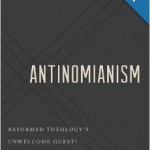 Antinomianism: Reformed Theology’s Unwelcome Guest? by Mark Jones. This is a tour-de-force of historical and pastoral theology. As Guy Waters says in his endorsement, “What does a seventeenth-century theological controversy have to do with Christian living in the twenty-first century? Everything.” Far from being a polemical work against modern antinomianism, this book displays a Reformed understanding of sanctification and the pursuit of holiness from a confessional perspective. Jones ably shows that historic antinomianism means much more than a person being “against law.” Historically, antinomianism was an elusive mix of six factors: 1) ridiculing the idea that Christians should imitate Christ, 2) rejecting of the law as a means of sanctification, 3) denying a law-gospel distinction that said the law is a friend to Christians and the gospel contains prescriptive parts, 4) refusal to speaks God rewarding of good works, 5) espousing the belief that God does not love us any more or any less on the basis of our obedience or lack thereof, and 6) putting forth a view of assurance that has no place for subjective fruit flowing from the objective work of Christ. Jones says, “When all or at least most of these errors are combined in a preaching ministry, you have [historic] antinomianism” (128). One of the most illuminated works I’ve read all year and surely the one I underlined the most.
Antinomianism: Reformed Theology’s Unwelcome Guest? by Mark Jones. This is a tour-de-force of historical and pastoral theology. As Guy Waters says in his endorsement, “What does a seventeenth-century theological controversy have to do with Christian living in the twenty-first century? Everything.” Far from being a polemical work against modern antinomianism, this book displays a Reformed understanding of sanctification and the pursuit of holiness from a confessional perspective. Jones ably shows that historic antinomianism means much more than a person being “against law.” Historically, antinomianism was an elusive mix of six factors: 1) ridiculing the idea that Christians should imitate Christ, 2) rejecting of the law as a means of sanctification, 3) denying a law-gospel distinction that said the law is a friend to Christians and the gospel contains prescriptive parts, 4) refusal to speaks God rewarding of good works, 5) espousing the belief that God does not love us any more or any less on the basis of our obedience or lack thereof, and 6) putting forth a view of assurance that has no place for subjective fruit flowing from the objective work of Christ. Jones says, “When all or at least most of these errors are combined in a preaching ministry, you have [historic] antinomianism” (128). One of the most illuminated works I’ve read all year and surely the one I underlined the most.
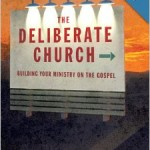 The Deliberate Church: Building Your Church on the Gospel by Mark Dever and Paul Alexander. The Deliberate Church is one of the finest, and most expansive, books on practical ecclesiology available today. Divided into three parts (Gathering the Church, When the Church Gathers, and Gathering Elders), the book covers everything from faithful pastoring to shepherding to the regulative principle to how a healthy elder meeting is run. Dever views this book as the conclusion to an ecclesiological trilogy that began with 9 Marks of a Healthy Church and Polity. This book will challenge, encourage, and sharpen pastoral and congregational convictions in the best ways. It is one of two primary resources we use at IDC for elder candidate training.
The Deliberate Church: Building Your Church on the Gospel by Mark Dever and Paul Alexander. The Deliberate Church is one of the finest, and most expansive, books on practical ecclesiology available today. Divided into three parts (Gathering the Church, When the Church Gathers, and Gathering Elders), the book covers everything from faithful pastoring to shepherding to the regulative principle to how a healthy elder meeting is run. Dever views this book as the conclusion to an ecclesiological trilogy that began with 9 Marks of a Healthy Church and Polity. This book will challenge, encourage, and sharpen pastoral and congregational convictions in the best ways. It is one of two primary resources we use at IDC for elder candidate training.
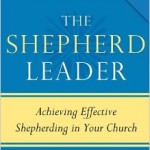 The Shepherd Leader: Achieving Effective Shepherding in Your Church by Tim Witmer. This is the other primary resource we use in our elder candidate training. The initial chapters on biblical and historical foundations for shepherding are solid, but it is in part two – “A Comprehensive Matrix for Shepherding” – where the book’s value is seen. Witmer wisely walks through the distinction between macro and micro shepherding and then says a faithful shepherding ministry consists of four parts: knowing, feeding, leading, and protecting. He provides the undisputed biblical backing for each part and then proceeds to recommend how a church can go about integrating macro and micro shepherding for each part. I have recommended this book to countless pastors over the last few years and not a few of them have said it completely restructured their thoughts on shepherding. And that’s a good thing.
The Shepherd Leader: Achieving Effective Shepherding in Your Church by Tim Witmer. This is the other primary resource we use in our elder candidate training. The initial chapters on biblical and historical foundations for shepherding are solid, but it is in part two – “A Comprehensive Matrix for Shepherding” – where the book’s value is seen. Witmer wisely walks through the distinction between macro and micro shepherding and then says a faithful shepherding ministry consists of four parts: knowing, feeding, leading, and protecting. He provides the undisputed biblical backing for each part and then proceeds to recommend how a church can go about integrating macro and micro shepherding for each part. I have recommended this book to countless pastors over the last few years and not a few of them have said it completely restructured their thoughts on shepherding. And that’s a good thing.
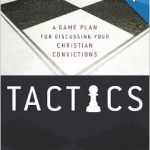 Tactics: A Game Plan for Discussing Your Christian Convictions by Greg Koukl. Koukl loves to engage non-believers in conversation and this book is an overflow of his apologetics ministry. He is wise to note that most skeptics have a kind of “theology by osmosis” that will fall in on itself when the right questions are asked. And that really is the overarching tactic he advocates: asking wise and probing questions. Doing so will help reveal the irrationality fueling unbelief. Koukl does, at times, lean more into an evidentialist approach than I would recommend, but overall this is a very helpful resource for lay members. If a church member is interested in apologetics I might start ’em on Koukl, then move ’em on to Frame, and conclude the training with Oliphant’s latest.
Tactics: A Game Plan for Discussing Your Christian Convictions by Greg Koukl. Koukl loves to engage non-believers in conversation and this book is an overflow of his apologetics ministry. He is wise to note that most skeptics have a kind of “theology by osmosis” that will fall in on itself when the right questions are asked. And that really is the overarching tactic he advocates: asking wise and probing questions. Doing so will help reveal the irrationality fueling unbelief. Koukl does, at times, lean more into an evidentialist approach than I would recommend, but overall this is a very helpful resource for lay members. If a church member is interested in apologetics I might start ’em on Koukl, then move ’em on to Frame, and conclude the training with Oliphant’s latest.
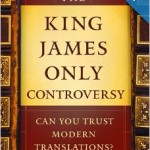 The King James Controversy: Can You Trust Modern Translations? by James White. This book is probably the “go to” resource for addressing the KJV Only debate. Thankfully, the controversy seems to have noticeably declined over the last 15-20 years. I have only dealt with it once in my ministry. If you have friends or family members that look down on your NIV or ESV translation because they only want the King’s English, grab a copy of White’s book. Otherwise I’d pass it over.
The King James Controversy: Can You Trust Modern Translations? by James White. This book is probably the “go to” resource for addressing the KJV Only debate. Thankfully, the controversy seems to have noticeably declined over the last 15-20 years. I have only dealt with it once in my ministry. If you have friends or family members that look down on your NIV or ESV translation because they only want the King’s English, grab a copy of White’s book. Otherwise I’d pass it over.
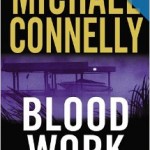 Bloodwork by Michael Connelly. I might need a break from Connelly for a while, but it’s not because I didn’t like this book. In fact, I found this book to be intriguing, surprising, and unique. The issue at play for me is Connelly’s continual employment of a “twist” ending. Knowing a twist is likely coming at the end I engage in a sort of competition with Connelly: will he surprise me or will I accurately predict the surprise? Because I am, how do you say, pathologically competitive, the joy of reading is somewhat stolen. Bloodwork illustrated this principle all too well. So, even though he remains my favorite crime writer, I think Connelly and I will separate for a period of time. And, oh yeah, I had Bloodwork‘s ending nailed about a third of the way in.
Bloodwork by Michael Connelly. I might need a break from Connelly for a while, but it’s not because I didn’t like this book. In fact, I found this book to be intriguing, surprising, and unique. The issue at play for me is Connelly’s continual employment of a “twist” ending. Knowing a twist is likely coming at the end I engage in a sort of competition with Connelly: will he surprise me or will I accurately predict the surprise? Because I am, how do you say, pathologically competitive, the joy of reading is somewhat stolen. Bloodwork illustrated this principle all too well. So, even though he remains my favorite crime writer, I think Connelly and I will separate for a period of time. And, oh yeah, I had Bloodwork‘s ending nailed about a third of the way in.
